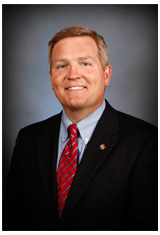JEFFERSON CITY — This week, the Missouri General Assembly convened for its annual veto session to consider overriding bills the governor had vetoed. Of the 29 vetoed bills, one bill sponsored by Sen. David Pearce, R-Warrensburg, received a passing two-thirds vote in both chambers to become law.
The overridden bill, Senate Bill 9 is an agricultural bill containing different provisions, including granting University of Missouri Extension councils the ability to create districts in order to better utilize resources. Additionally, SB 9 strengthens protections for livestock owners in Missouri.
“I am very happy this bill was so well-received, even after its veto,” Sen. Pearce said. “Missourians, especially those relying on livestock and agriculture as a job and a way of life, deserve to feel as if someone is watching out for their well-being. Strengthening protections against livestock theft and against livestock abuse are important functions.”
Currently under state law, any animal that is loose can be subject to trespassing violations, as well as abuse and neglect violations. Senate Bill 9 narrowed the definitions of animal trespass to mean the failure to provide adequate control of an animal for 12 hours or more and is a Class C misdemeanor punishable by up to a $200 fine for the first infraction and $500 for the second.
Cattle rustling has become increasingly problematic in Missouri. This measure also increased the punishment for livestock theft, or cattle rustling, up to a Class B felony.
The veto override was supported by many Missouri organizations, including Missouri Cattleman’s Association, Missouri Chapter of the Poultry Federation, Missouri Corn Growers Association, Missouri Dairy Association, Missouri Egg Council, Missouri Pork Producers, and Missouri Soybean Association.
Missouri Cattlemen’s Association President Chuck Massengill celebrated this victory along with more than 52,000 farms and ranches. "The success Missouri agriculture has seen this past year has been great. Many farm families will benefit from the passage of SB 9," said Massengill. "This bill is a step in the right direction and will help producers protect their business and livelihood."
Per the Missouri Constitution, the General Assembly meets once each year to discuss the governor’s vetoed bills and to have the chance to review the legislation and try override the governor’s veto on any bills the Legislature deems beneficial. In order to override a veto, a bill needs a two-thirds vote in each chamber, which means 23 votes in the Senate and 109 in the House. SB 9 received a 23-10 vote in the Senate and 111-50 in the House. This year, a total of 10 measures were overturned, a record number for the Missouri Legislature.
|



